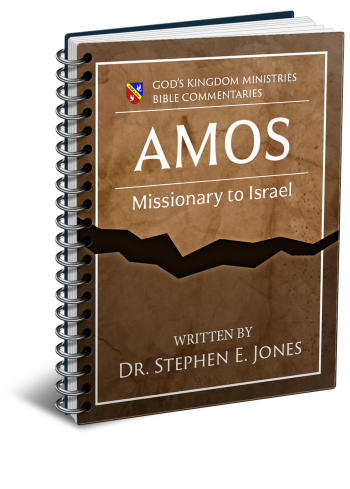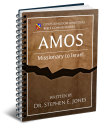Latest Posts
View the latest posts in an easy-to-read list format, with filtering options.

Amos was a missionary from Judah to Israel, giving them a final warning to repent before divine judgment was to destroy the nation. They refused, and two years later the nation was struck by a massive earthquake that destroyed their defenses and allowed the Assyrians to conquer them easily.
Category - Bible Commentaries

In the next judgment being pronounced, Amos 2:1 says,
1 Thus says the Lord, “For three transgressions of Moab and for four I will not revoke its punishment, because he burned the bones of the king of Edom to lime. 2 So I will send fire upon Moab, and it will consume the citadels of Kerioth; and Moab will die amid tumult, with war cries and the sound of a trumpet. 3 I will also cut off the judge from her midst, and slay all her princes with him,” says the Lord.
Nations fought each other all the time, and most of the time they violated the laws of war (Deut. 20). There is no specific law against burning the bones of an opposing king, but God took offense when Moab did this to the Edomite king to dishonor him and erase his memory from history.
This reveals first that not all laws of war are written down in Scripture. Second, it reveals that God intended to hold Moab accountable for violating His laws of war. Ammon was cruel, but Moab sought to disgrace its opponent. Both actions brought rebuke from Amos and from God Himself. The Wycliffe Bible Commentary adds,
“The Targum [Jewish translation and explanation] indicates that the king of Moab used the powder to plaster his house.”
If this is what happened, then perhaps God’s anger was directed more at this particular excess. So even as Moab used fire to burn the bones of the king of Edom, so also God said He would “send fire upon Moab” to consume their citadels—including the king’s house that had been plastered with the ashes or dust of the king of Edom.
Moab and Ammon were born of incest from Lot and his two daughters. From this incestual beginning came two nations, each named for their original progenitor by whose name they are known. According to the law in Deut. 23:2, 3,
2 No one of illegitimate birth shall enter the assembly of the Lord; none of his descendants even to the tenth generation, shall enter the assembly [kahal] of the Lord. 3 No Ammonite or Moabite shall enter the assembly [kahal] of the Lord; none of their descendants, even to the tenth generation, shall ever [olam] enter the assembly [kahal] of the Lord.
This was not a permanent ban, but should be viewed as a curse upon the nation that lasted ten generations. The Hebrew word olam used above does not mean unending time, as many have claimed, but refers instead to an indefinite period of time. Olam is from the root word alam, “to hide.” When applied to time, olam refers to a hidden period of time. In the case above, ten generations is not a fixed period of time. It might be estimated ahead of time, but the precise time period is hidden, indefinite, and unknown.
Of course, the generational curse upon Ammon and Moab can also be reversed by claiming the blood of Christ for cleansing. Furthermore, I suspect that many people today are descended from illegitimate sons whose circumstances of birth are long forgotten.
While many may be under such a curse, they may also be released from generational curses by prayerful appeals to the divine court through the blood of Jesus. Neither must they await the tenth generation to become part of the assembly (church).
The Hebrew word kahal, used above, is the congregation or assembly, not an institution or organization as such. It is the equivalent of the Greek word ekklesia, usually translated “church” in the New Testament.
The story of Ruth is pertinent here, because she was from Moab, who was born of incest and therefore was under the generational curse mentioned in Deut. 23:2, 3. It appears that Ruth was the tenth generation from the son of Lot named Moab. Hence, it is significant that she would come to Judah and essentially “enter the assembly of the Lord” at the end of the tenth generation.
To calculate the generations of Ruth from Moab, we have to compare her with other generations which are recorded in Scripture. Moab was the son of Lot, who was a contemporary of Abraham. The Bible counts generations in its genealogical tables: Abraham, Isaac, Jacob, Judah. Hence Judah was the third generation from Abraham. Judah too was involved in a form of incest with Tamar, his daughter-in-law (Gen. 38). See the comparison in the chart below:
Like Moab, Judah too came under a ten-generation curse, but his began three generations later. As a result of his actions, Judah’s calling to provide Israel with a king could not be fulfilled until his tenth generation. David was the tenth generation from Judah, and he was crowned king. Likewise, it appears that Ruth was the tenth generation from Moab.
But we see also that Ruth the Moabitess married Boaz, the seventh in the lineage from Judah. She herself was the tenth from Moab, but she married Boaz, the seventh in the line of Judah. Judah still had to wait three more generations before the king could enter the assembly and come to the throne.
Hence, if the generations of Ruth were about the same length as the generations of Judah, we can assume that Ruth was the tenth generation from Moab, even as David was the tenth from Judah.
I believe that Ruth was a biblical example to show us how this law applies not only historically but prophetically as well. The law in Deut. 23:2, 3 was not meant to ban all those of illegitimate birth from being part of the church, but to show how one man’s actions can affect generations of his descendants.
As for Ruth herself, God sent a famine in the land of Judah so that Naomi and her husband would be driven to Moab. There her son would marry Ruth. Ruth later changed her identity from Moabite to Israelite. In Ruth 1:16 she says, “Your people shall be my people, and your God, my God.” This foreshadowed the greater truth of the New Covenant, where we are able to change our identity from being children of flesh to being children of God by faith in Christ.
It also shows that being a child of Abraham or being an Israelite is not a matter of race or genealogy, but of faith. By faith Ruth joined “the household of faith” (Gal. 6:10). From then on, she and her children were Israelites that enjoyed all the rights and privileges of citizenship. Israel was always a nation, rather than a race. Citizenship was a legal matter, not based on genealogy.
This example also shows that when the prophets speak against nations as a whole, it does not mean that individuals within that nation are doomed. Everyone has opportunity to change his/her citizenship, as Isaiah 56:6-8 makes clear. Paul agrees, writing in Phil. 3:20,
20 For our citizenship is in heaven, from which also we eagerly wait for a Savior, the Lord Jesus Christ.
Again, Paul says in Col. 1:13,
13 For He delivered us from the domain of darkness, and transferred us to the Kingdom of His beloved Son.